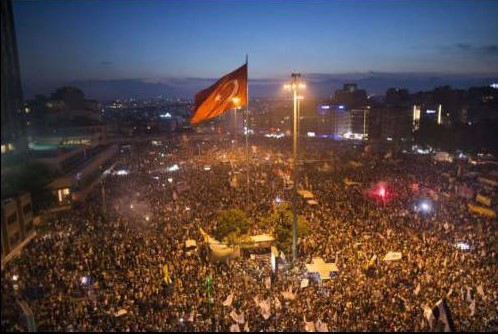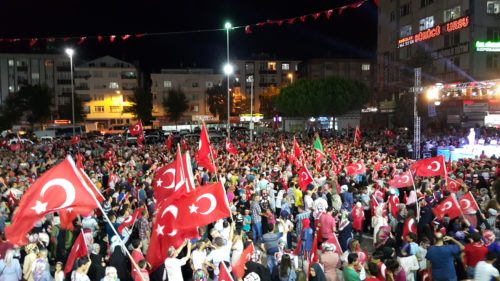TURKEY — On July 15, reports exploded across the world’s media that there had been a military coup against the regime of President Recep Tayyip Erdogan (pronounced Erdon) in Turkey. The reaction across the European Union, which Turkey is negotiating to join, was shock and intrigue.
Erdogan, who first came to power in 2003 (as prime Minister until 2014, and President since then) is regarded in Europe as a divisive, authoritarian figure with Islamic fundamentalist leanings. Since Erdogan’s ascendancy, Turkey has slowly been transformed from the secular, progressive Islamic vision of Kemal Ataturk into an increasingly religious and conservative state. Such a change has resulted in an increasing amount of pressure on Turkish Pagans for years.

The Hagia Sophia mosque in Istanbul was a Greek Orthodox Christian basilica when the city was called Constantinople. [Photo Credit: Arild Vågen / Wikimedia]
“The past five years have been really hard,” said Redbird. “Pagans cannot express their views to other people in Turkey as they think we worship Satan. Turkey isn’t secular, in a secular country they can choose their beliefs – we can’t. My citizenship ID card states Islam as my religion but they didn’t ask me. When my father registered my birth, they put Islam as my religion, and I can’t get that erased.”
Redbird explained that it is also the same in schools, adding: “We just learn Islam, Islam. It’s going extreme, real extreme. Even Christians and Jews can’t say anything, not just pagans.”
Sythove stressed just how much Turkey has changed over the past few years. Erdogan has grown increasingly intolerant of any dissidence. A recent flashpoint was the Taksim Square riots in June 2013, during which local protesters were violently evicted from a peaceful sit-in over plans to urbanize Gesi Park.
Inspired by movements such as Occupy Wall Street, the protesters wanted, among other things, to protect the trees that were scheduled to be destroyed as part of the development. They were also there to protest Erdogan’s authoritarianism. The ensuing riots were suppressed with tear gas and water cannons. In the end, 11 people killed and 8,000 injured.

The protests at Taksim Gesi Park in 2013 [Photo Credit: Fleshstorm / Wikimedia]
Turkey’s story represents something of a pattern for the Middle East, which has been exacerbated by recent International involvement, primarily from the US and UK, which has destabilised the entire region. This has not affected Turkey directly, but has resulted a flourishing of the more fundamentalist arms of Islam across the Middle East.
Over the past few months, tension has built up enormously. Just a month ago, police shut down the annual Istanbul Gay Pride festival, which has been held without concern since 2003. There were issues with the event last year, and the permits to hold the 2016 event were denied. But the festival went ahead anyway. Nineteen people were arrested and water cannons were used.
And, it was a similar story at a transgender event held in Istanbul the week before the Pride March. This authoritarianism is creeping into more informal events as well. Redbird said, “A few weeks ago I heard of a man, I can’t remember where he was from, but it was somewhere in the Far East, and he had a party for Coldplay fans to come and listen to their music at his house. The police went to his house, broke up the party and began beating people.”
It would seem that even this type of more secular, informal gathering is now difficult to hold. “This was not a problem a few years ago,” Redbird stressed. “People could have a party with alcohol. Even non-Muslim shopkeepers who serve alcohol are now being beaten by the police. None of this was happening a few years ago.”
Sythove echoed her comments. “I’ve noticed people being less open, there are more headscarves around now, women are less open as the men seem to guard them – even in Istanbul. I never thought I’d see that in Istanbul.” Although Ankara is the official capital, Istanbul is its most prominent city and enjoys a more liberal reputation than some of its other regions.
The hijab is becoming an increasingly common feature in daily Turkish life. There is concern that this will put pressure on greater numbers of women to wear one. Erdogan is also putting a constant pressure on the judiciary of Turkey to overturn the Constitutional ban on wearing headscarves in public institutions. Redbird said, “We are getting used to it now though, unfortunately. We have to.”
With the way things are going, she admits that she is pessimistic about the future. “It will become like Iran here. There will be no difference between Iran and Turkey.”
Sythove said that since the attempted coup was quashed, Erdogan has worked to tighten his grip on power. More than 60,000 people have been arrested. Erdogan claims that the failed revolt was the work of his former ally Muhammed Fethullah Gülen, Turkey’s main opposition leader who now lives in exile in Pennsylvania, US.
Sythove added, “Academics are not allowed to leave the country, as Erdogan believes many schools and teachers are funded by Gulan.” Redbird chipped in: “That’s a lie!”
Concerned for friends she has across Turkey, Sythove said, “I have some friends who I cannot get hold of, who were having problems even a couple of years ago (due to their beliefs and associations). This has been bubbling under for about two to three years.”
Redbird agreed, adding: “You would hear of isolated cases where someone would be arrested, but nothing on this scale. I’m really scared of everything now. I am scared for my life, for my friends’ lives, for my family’s lives. If I had the opportunity I would leave Turkey. My husband and I are looking into study programmes so that we can leave.”
Unfortunately, Turkey was on the brink of a deal with the EU to ease visa restrictions from Turkey, making work and study more accessible to Turkish citizens. This has been quickly dropped since the failed coup.
While not popular in Europe, Erdogan has solid support at home. He remains a popular figure. Sythove explained, “He has done a great deal for the poorer parts of Turkey, particularly the east. He has improved infrastructure and built roads, airports and so the people love him.”
Redbird added, “Many here are calling for the death penalty for the coup collaborators and soldiers. They are playing music to celebrate.”

Turks take to the streets of Istanbul to oppose the attempted coup in July [Wikimedia]
Alarm bells rang in Western Europe earlier this year when major Turkish newspaper Zaman, which was critical of Erdogan and his regime, was seized and its journalists arrested. Zaman was then completely shut down.
These actions were not considered those of a leader who upholds the democratic, secular values of the EU. With Turkey poised to join the politico-economic bloc, and Chancellor Angela Merkel handing the nation billions of euros to keep refugees there in order to ease pressure on Germany, the Brussels bureaucrats were getting worried.
However, the coup put paid to that. Erdogan was pictured facetiming Turkish CNN to urge everyone to get out on the streets and show their support for him. They answered his call and at some time during the night the army surrendered. Many have since questioned whether the coup, which appears to have been poorly planned and executed to the point of farce, was actually orchestrated by Erdogan to justify the subsequent purge and consolidation of his autocratic power.
There have also been reports that many of the troops involved in the attempted coup were unaware of what was happening and thought they were simply taking part in a major training exercise.
The one thing that is certain is, since the events of July 15, the Turkish regime has suspended, detained, or begun probing 60,000 people, including soldiers, policemen, judges, teachers, civil servants and journalists. In this climate, any political or ideological position considered to deviate from a state-sanctioned norm is under scrutiny. Given that the same may happen with religious views, Pagans in Turkey face an even more uncertain future than they did before the failed coup.
Many thanks to Renee Redbird for speaking to me under difficult circumstances, and to Morgana Sythove of PFI for her assistance.
Names and some details have been changed or omitted to protect identities.
The Wild Hunt is not responsible for links to external content.
To join a conversation on this post:
Visit our The Wild Hunt subreddit! Point your favorite browser to https://www.reddit.com/r/The_Wild_Hunt_News/, then click “JOIN”. Make sure to click the bell, too, to be notified of new articles posted to our subreddit.
Just to be sure we get the historical context:Before it even became the EU, the European Economic Community balked at full membership for a Turkey that was much more secular than it later became, because then the most populous country in the association would be majority Moslem. Rebuffed at closer European ties, Turkey gradually became a more typical Middle Eastern country.The entire sweep of North Africa and the Middle East, including Turkey, featured a variety of authoritarian and outright tyrannical leaders whom the West supported because they weren’t Communist. When Communism fell, the tyrants had been entrenched for a generation. After the US kicked over the first domino in Iraq, the region collapsed into the bloody shambles laughably misnamed the “Arab Spring.” It now has spread to Turkey.
I believe you also need to mention why they result to Muhammad’s Ideology that he developed hundreds of years ago versus any other.
At the time he unified a entire region through military and ideological means that was in complete shambles after the Romans left having ruled the area for over a thousand years and left a power vacuum at the time of their departure. You’ll then see Muhammad’s youngest uncle Al-‘Abbas ibn ‘Abd al-Muttalib lead the third caliphate to succeed his nephew into the most powerful empire this world has ever seen so far. Then of course eventually transforming into the Ottoman Empire which fell into political disarray after WWI left it grabbing for the world power the Europeans once had with some wanting to become more modern in order to compete while others voting to stay true to Muhammad’s plan out of obligation, a discourse that continues to this day.
As a fellow pagan in Turkey, I have to make two corrections to this interview.
1. “When my father registered my birth, they put Islam as my religion, and I can’t get that erased.”
This unfortunately is not true. Anyone over 18 can go and change religion on their ID cards or leave it empty. I have done it 12-13 years ago.
2. Redbird said, “A few weeks ago I heard of a man, I can’t remember where he was from, but it was somewhere in the Far East, and he had a party for Coldplay fans to come and listen to their music at his house. The police went to his house, broke up the party and began beating people.”
This unfortunately is a little off. It was not the police, it was a group of “muslim citizen” who thought they had the right attack people because they were drinking alcohol in ramadan. Not that it makes it any better.
Blessed be.
Can Cotuk
Just because you were able to change the religious affiliation listing over a decade ago, has ABSOLUTELY NO BEARING on Redbird not being able to do so today. If he says he’s unable to do so, he’s unable to do so now. It’s no longer 12-13 years ago, the barbarians have stormed the gate and taken over. So spare us this steaming pile of pig defecation you regurgitated.
Can Cotuk wrote:
“This unfortunately is not true. Anyone over 18 can go and change religion on their ID cards or leave it empty. I have done it 12-13 years ago.”